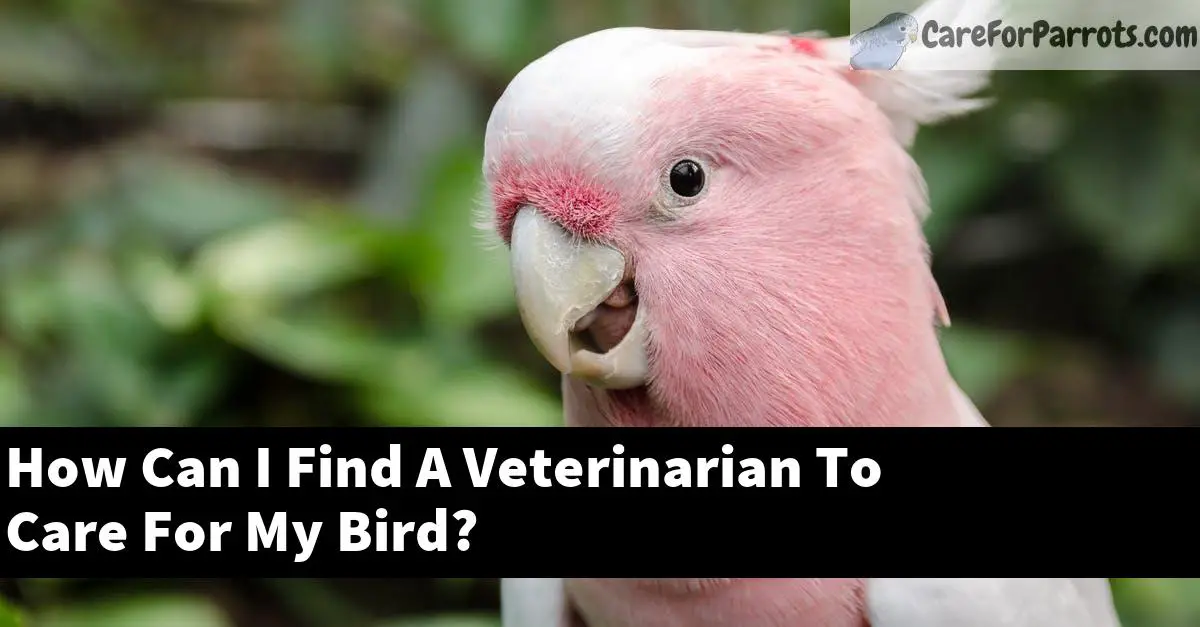There are many veterinarians in the United States who specialize in caring for birds, and it is best to consult a veterinarian who is familiar with birds and their needs. Some good resources for locating a veterinarian who specializes in birds are the American Veterinary Medical Association (AVMA) website and the Pet Bird Guides website.
Table of Contents
How do I find a veterinarian who specializes in caring for birds?
When it comes to finding a veterinarian who specializes in caring for birds, it is important to do your research. There are many different types of veterinarians who may be able to provide the care your birds need, so it is important to ask around and find someone who you trust.
Some good places to start your search include veterinary associations, online directories, and vet clinics. Additionally, it can be helpful to ask your bird-owning friends for recommendations.
What are some things to look for in a good avian vet?
There are a few things to look for when selecting a good avian veterinarian. First, the veterinarian should have experience treating birds.
Second, the veterinarian should be knowledgeable about avian health and be able to provide appropriate care for your birds. Third, the veterinarian should be able to provide a diagnosis and provide appropriate treatment recommendations.
Finally, the veterinarian should be able to provide follow-up care for your birds.
How can I tell if my bird is sick and needs to see a vet?
There is no one definitive way to tell if your bird is sick and needs to see a vet, as there are many different diseases and conditions that can affect birds. However, some signs that may suggest that your bird is in need of veterinary care include: loss of appetite, weight loss, lethargy, decreased activity, coughing, sneezing, vomiting, diarrhea, and red eyes.
If you notice any of these signs in your bird, it is best to schedule an appointment with a veterinarian as soon as possible.
What are some common health problems that affect birds?
There are many common health problems that affect birds. Some of the most common problems include:
• feather loss
• respiratory problems
• obesity
• parasites
• diseases
• malnutrition
Feather loss is a common problem in birds, as are respiratory problems.
Obesity is also a common problem in birds, as is malnutrition. Diseases are also a common problem in birds, as are parasites.
How can I prevent my bird from getting sick?
There are a few things you can do to help keep your bird healthy and prevent them from getting sick.
First, make sure they have access to fresh water and food.
Make sure their food is fresh and has the right nutrients, and make sure they have plenty of water.
Second, keep their environment clean.
Make sure their cage is clean and free of any droppings or feathers. Keep their perches clean and dry.
Third, make sure your bird is up-to-date on their vaccinations. Make sure they have the proper vaccinations for their species, and if they are traveling, make sure they have the appropriate vaccinations for the area they are traveling to.
Fourth, keep an eye on your bird’s health. If you see any changes in your bird’s behavior, such as increased difficulty breathing, vomiting, or diarrhea, take them to the vet immediately.
What should I do if my bird is injured?
If your bird is injured, you should take it to a veterinarian as soon as possible. A veterinarian can help your bird by diagnosing the injury and prescribing the appropriate treatment.
How can I tell if my bird is stressed or unhappy?
When looking to determine if a bird is stressed or unhappy, it is important to consider a variety of factors. Some indicators that a bird is stressed can include:
• Restlessness or pacing around the cage or room
• Refusal to eat or drink
• Lack of activity
• High-pitched squawking or crowing
• Fatigue or listlessness
• Unusual feathering or behavior
• Aggression or fearfulness towards humans or other birds
It is also important to consider the bird’s environment and lifestyle.
If the bird is kept in a stressful environment, or if it is forced to live in an unnatural environment, it is more likely to be stressed. Some factors that can increase a bird’s stress level include:
• Too much noise or bright light
• Being kept in a small cage or room
• Not having enough room to spread their wings
• Not being able to see out of the window or door
If a bird is displaying any of the above signs of stress, it may be best to consult with a veterinarian or avian specialist to determine the best course of action.
Summary
A veterinarian who specializes in caring for birds is a good resource to consult when you want to know about the specific needs of birds.






